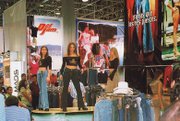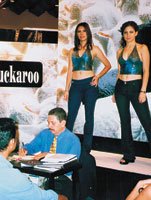American Brands, If Not Buyers, Abound at Intermoda
GUADALAJARA, MEXICO—American brands showed side-by-side with Mexican labels, piece goods distributors, technology providers and a few thinly veiled knockoffs at the Intermoda show held July 16–19 at the Guadalajara Expo.
Billed as “la exposicion de moda mas grande de America Latina” (the largest fashion exposition in Latin America), the show regularly draws 40,000 visitors including 25,000 buyers, according to Jaime Barba de Loza, current treasurer and outgoing president of the show, although some of the approximately 800 exhibitors at the recent edition of the event said they felt that there were more exhibitors than buyers there.
Part of that perception could be the result of hosting a combined retail show and sourcing show, which drew both retailers from Mexico and surrounding countries as well as smaller Mexican manufacturers looking for new fabrics, new equipment and new ideas at the event.
The 20-year-old biannual show draws some U.S. traffic, although those numbers have decreased in recent years, said Barba de Loza, noting that three years ago, the typical U.S. turnout was about 1,000, but this year Americans numbered somewhere between 200 and 300.
Still, for American exhibitors such as Shirley of Hollywood, American Apparel and YMLA, the show provides access to the Mexican apparel market.
This marked the first Intermoda for Los Angeles- based blank-T-shirt maker American Apparel, according to Jaime Coblentz, director of global accounts for the company.
“We’re trying to build an image for ourselves in Mexico,” he said, noting that the initial response at the show was positive.
The Mexican market is difficult for an American company to break into, but worth the effort, according to Leticia Navarro, Latin American account manager for Shirley of Hollywood. The Vernon, Calif.-based lingerie manufacturer has been attending the show for the past five years. Navarro said at first, buyers came in to the booth to look, intrigued by the product and by the “Hollywood” name, but didn’t buy.
“Now they look for us,” she said.
The company has two distributors in Mexico, who have been representing the label for more than 15 years, according to Navarro, who said she handles the two large department store accounts, Liverpool and El Palacio de Hierro.
The show also featured several American labels licensed or registered with Mexico-based firms, including that of Jorge Luis Renteria Murphy, whose Zapopan-based firm has held the registry for the Mossimo men’s label since 1989. Renteria, who can sell the brand only in Mexico, said he meets primarily with small Mexican boutiques at the show. He also carries the line, which he designs as well, in his stores in Los Cabo, Puerto Vallarta, Cancun, Mexico City and Guadalajara.
Intermoda veteran Marco Corral, creative director for the Mexico City-based Neo Pacifico company, which has held the Ocean Pacific license since 1985, said, “Considering the economy, [the show is] pretty busy.”
Corral said despite the attendance by sourcing companies looking to meet with current and potential clients, he prefers to use his time at the show to meet with retailers.
“As a brand, I don’t want to spend my time dealing with suppliers—that’s why we have an office,” he said, adding, “[At the show], I want to spend time with buyers.”
Familiar American labels including Fubu, Perry Ellis and Generra Collection were prominently displayed at Intermoda. But the show also drew several Mexico-based companies with names similar to international brands, such as Giorgio Montana, Def Jam, Alfanumeric, Bijan and Crazy Boxer (whose packaging materials resembled those of San Francisco- based Joe Boxer).
Leopoldo Escudero, maker of Monterreybased menswear label Bijan and women’s apparel label Le’Mesic, distinguished his company’s name from the Beverly Hills, Calif.-based high-end menswear line of the same name by noting that his 14-year-old company is called “Productos Bijan.”
Still, most U.S. brands exhibiting at the show said they were not worried about Mexican competitors with similar-sounding names. Shirley of Hollywood’s Navarro said her line has been duplicated in Brazil but not in Mexico.
In Brazil, “they copy images from my Web site and get orders, but not here in Mexico,” she said.
Intermoda Draws Satellite Show
Much like the smaller shows that run concurrently with MAGIC International in Las Vegas, Mexico’s Intermoda show has drawn some offsite competition.
July 17–20 marked the third run for Interjeans, a small trade show featuring manufacturers of men’s, women’s and children’s jeans, held at the Fiesta Americana hotel in Guadalajara. The show was held once before in Guadalajara and once in Culiacan, a city on the west coast of Mexico.
The show drew about 500 buyers, according to Interjeans show director Miguel Angel Contreras, although some exhibitors estimated the buyer number to be closer to 200.
Some of the 40 Interjeans exhibitors had shown at Intermoda in the past, but organizers said they wanted to create a more focused trade show that would be easy for buyers to shop.
“If you are interested in denim and if you go to the other show you have to walk miles,” said Luis Zamora, general manager of Guadalajara-based Kuantas Kangaroo Jeans, one of the show organizers. “Here it’s 40 companies all making denim clothing. It’s easy to visit a show like this.”
Most of the exhibitors were family-owned companies that had been in business for several generations. However, there were some new lines, including Acatlan de Juarez-based Comercializadora Sotres, maker of 3 Cows Westernwear. Owner Adrian Sotres said he planned to next take his collection of traditional Mexican cowboy apparel to a Western wear show in Leon, Mexico, later this year. He added that he eventually plans to open a U.S. office in Las Vegas.
Like its larger counterpart Intermoda, Interjeans had a few labels with familiar—or somewhat similar—brand names, including Roxy, Angel Jeans and Jopp Jeans. Roxy owner Manuel Garcia said he had owned the brand for the past seven years.
Contreras said the show grew to 40 exhibitors from 34 at the last show in January, although he added that the organizers plan to keep the show small and manageable.
“We don’t want to grow too much. Fifty would be a good number because it’s a specialty show,” he said.
For more information about Interjeans, call 33 36 39 55 43.
Local Latin Group Seeks Mexico Ties
The Los Angeles chapter of the Latin Business Association (LBA) was also in attendance at the July 16–19 Intermoda show in Guadalajara, Mexico, to investigate the opportunities for its members, according to Ruth Lopez Williams, chairman of the board, who helped organize the trade mission.
The LBA has about 1,000 members and outreach to about 42,000 Latino- owned businesses, Lopez said.
The group brought along Ilse Metchek, executive director of the California Fashion Association (CFA) and L.A. by Design, to see whether there were business opportunities at the show that could benefit both LBA and CFA members.
Metchek said she joined the trade mission to look for ways “to assist Mexican companies for entry into the U.S. market by using our pre-production and post-production sources in Los Angeles to design, deliver and distribute Mexican brands.”
The LBA hopes to be able to set up business meetings between their members and potential partner businesses in Mexico. Several LBA members from other industries also participated in the trade mission and met with potential business contacts during the trip. Lopez said the LBA hopes to extend the same matchmaking services to its apparel industry members.
“We need to reinforce that message that we can’t look for solutions internally in our own community,” Lopez said.
A meeting was held at the trade show with LBA board members, Metchek and several members of the Mexican apparel industry, including Jaime Barba de Loza, past president and current treasurer of the show; Jesus Castallanos, current Intermoda president; Jose Manuel Martinez, director of the Institute of Design in Jalisco; Juan Santos Saacute;nchez Navarro, president of the garment association of Jalisco; Mario Flores Aguilar, owner of Guadalajara-based contractor Qualsew; LBA board members Lopez and Jose Velasco; and Salvador Cuevas Acuntilde;a, president of the LBA in Guadalajara.
The meeting participants agreed to explore future partnership opportunities, including a possible seminar series on fostering business on both sides of the border at a future Intermoda show.
Metchek said her ideal roundtable would include experts in making the United States and Mexico a “global unit” and “utilizing the skills we have to offer.” Possible roundtable participants could include a factor or international bank with an office in Mexico, a buying office, one or two design studios, an EDI (electronic data interchange) manager, a technology provider who can discuss how to interface between a Los Angeles office and Mexico, and a freight facilitator.























